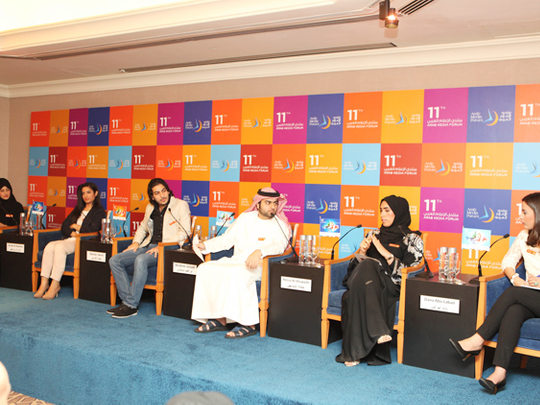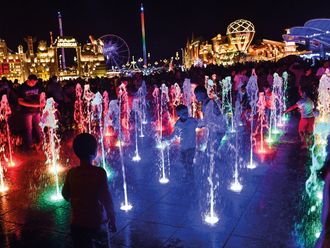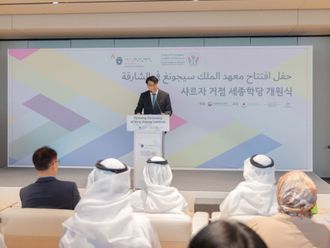
1:32pm: Moataz Al Demerdash, TV presenter and host from Egypt, said there are code of ethics followed by major news networks. Publishers and editors should hire qualified and professional people, not because the candidate is beautiful, he said, drawing applause from the audience.
1.24pm: Samia said the media should protect anonymity of victims of violence or fighters when requested.
Alain Gresh, editor of Le Monde Diplomatique, said you can't make a clear demarcation between social media and traditional news - they both must be used responsibly.
Dr Badria Al Beshr, TV presenter with MBC, said social media isn't "more humane" about people's suffering. There are videos or images of child abuse victims, for example, shared online. Gossip, name-calling and backbiting also spreads fast on social media. This technology provides anonymity to perpetrate such acts.
Al Demerdash added the attitude of some western broadcasters have been forced to take action against prominent presenters because they can't hide from social media reports accusing wrongdoing. In general in the Arab world, by comparison, there can be shouting matches on tv talk shows but no action is taken. There should be accountability when it comes to how hosts and guest are treated.
1.19pm: Media experts debated The Chaos of Ethics in covering conflicts and verifying social media reports at the forum.
Samia Nakhoul, Middle East Bureau Chief at Reuters, said Syria is hard to cover. When there was a video on the alleged use of chemical weapons, we tried to verify it before broadcasting it.
Alain Gresh, editor at Le Monde Diplomatique, said lies are not a new thing. There was no social media before but there were still false reports.
Session moderator Sahar Al Mizari, TV presenter, Dubai channels, network questioned whether whistleblower Edward Snowden can be considered a citizen journalist.
Samia replied that in general sources must be named and open to scrutiny
Moataz Al Demerdash, TV presenter and host from Egypt, said in his experience in Egypt people question why he doesn't be "frank" on air. But there are legal consequences of what we say and those have to be considered. He added the anchors job is not to impose his opinions on the show
Al Demerdash said he has also been a victim of a fake Twitter account tweeting in his name.
Samia said social media can be a "merit or curse". Scenes of Daesh beheadings are "intimidation and propaganda" and should not be shown.
12.16pm: Dr Anwar Mohammad Gargash, Minister of State for Foreign Affairs, said: "I think that the crisis in Yemen today is subject to an immediate remedy. Our objectives are clear and we don't want any regional intervention by force.
"Getting Yemen out of it's crisis will not be done militarily only. Direct emergency assistance to Yemen are there we want to open the Hudaida port for assistance needed. Which are needed much more than air assistance.
"We think that the GCC countries realise the immense responsibility. There is a belief that dealing with the crisis in Yemen should be different using different tools which was gained from the Egypt experience.
"Concerning the reconstruction of Yemen, holding a conference is possible because there is an accumulation of knowledge and tools are already there for us to use but there are priorities, some things precede others.
"I think that the issue with the UAE is that it has changed than 40 years ago. We have more relations and political impact now. We are not seeking a regional role, we want to enhance modernity and moderation in the Arab world.
"With all success we achieve there is still turbulence in the region so we direct out capabilities to support Arab stability. Our volume has changed and our capabilities are different. Our role is essentially partnership, we are a member of the Arab team that does not want interference in the region's internal affairs. We cannot deal with issues with instincts or sectarian approaches.
"Part of our Arab responsibility is not to allow intervention from sectarians. We should bring back the respect to the Arab state and rules of law in the Arab region. We should work in the best interest of our values as Arabs.
"We should do our best to market and promote positive approaches because they pave the future. There is always a high ceiling of expectations and the outcome is bound to be less than the high ceiling but progress is still made.
"We look at a partnership with USA as very important.
"During the global crisis in 2008 it was normal that the UAE would be affected because it was the most globally exposed economy.
11.14am: Amer Moussa: "The Syrian crisis must be addressed by Arab countries. The crisis was left to foreign countries who have their own agendas."
11.10am: "Egypt's decision to join the 'decisive storm' is a sound decision," said Moussa. "Egypt should not be absent in the Arab East and instead should be the linking chain.
11.04am: Daesh will not control the Arab world, according to Moussa. "It's a temporary harmful cloud," he said. "I do not fear these groups. They are based on ignorance and misunderstanding and will only last for no longer than five years."
11.02am: Amr Moussa said: "The launch of the 'decisive storm' initiative led by Saudi Arabia and other Arab countries is one of the important events currently taking place that should be discussed.
"We are not ignorant and will not except more humiliation in the region as that which has taken place in Syria and Iraq. The five day humanitarian truce has started in Sana today, depending on its success, dialogue can be an option again. The purpose is to reconstruct and bring hope back to Yemen.
"Another challenge is the Israeli nuclear programme. It's is time to address the Israeli nuclear programme and bring the problem to the forefront. It will be the only nuclear programme in the region and in the center of the Arab world."
10.51am: Amr Moussa, Former Secretary-General of the Arab League, thanked the organisers of the forum for holding the AMF at a time that calls for urgency in the region.
He said the Middle East and Arab world have been subject to huge developments, and along with talks of creating a greater Middle East and a new Middle East, there has been mistakes made by the Arab countries along the way, due to the absence of good governance.
This has led to the rise of many negative indicators that have affected the lives of the average citizen and their future. The mistakes lay in the Arab societies and the way some Arab countries are run.
"This change was inevitable," he said. "The challenge is internal and is related to the rights and freedom of the citizen.
"Are we going to lead or are we being led?" questioned Moussa in a session examining 'regional political shifts'.
10.21am: Dr Barghouti said there should be "escalation" of boycott of Israeli businesses.
He presented a long list of problems facing Palestinians by Israel - which the media can harp on. His point was there is no shortage of topics to cover one after another, thereby keeping the issue alive in the media.
The secretary general added the Palestine struggle was not just an Arab or Muslim issue, but a human struggle.
"That's why it cannot die."
10.13am: The second and last day of the arab media forum opened with Dr Mustafa Barghouti, general secretary, Palestine national initiative, asking if the media has forgotten the Palestine cause.
Dr Barghouti said the emotional zeal of Arabs makes it impossible to be forgotten.
He added Palestine cause or violence in Gaza may be forgotten by some, but problems in Jerusalem and holy sites of Islam keep the issue alive.
The Secretary General told the guests that Palestine subject at this time is central and unifies the Arabs. He added its impossible to "delete" the issue internationally.
"I don't think Israel can remain isolated to what's happening in the Arab world," he said, adding that the 'Israel hand' is behind instability in the region.
Dr Barghouti said there are some steps media must take to keep the Palestine issue on the table.












